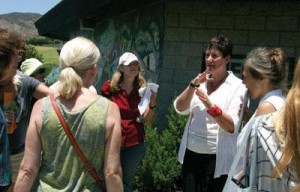Workshop aims at ‘Ocean Friendly Gardens’
A seminar was held last weekend in hopes of eliminating polluted runoff by educating the public about yard care and landscape design.
By Jimy Tallal / Special to The Malibu Times
Over 40 people attended a free three-hour seminar on ocean-friendly gardening and landscaping last Saturday at Malibu City Hall. Most of the attendees came away with positive things to say about the program.
Deborah Long, an 11-year resident of Broad Beach, said she was attending the seminar because, “It’s time to change over more of our garden and landscape to native plants. We’re right on the ocean, with 70 feet of ocean front on the bluff, and want to keep the bluff soil from eroding. I thought [this class] would be fun and useful. I picked up all of the information they had in Spanish [to give to the gardeners].” Long also hoped to learn about native plant selections for the coast. “The plants that grow on the land side of Broad Beach Road don’t necessarily do well right next to the ocean.”
An “ocean friendly garden” (OFG) helps maintain good water quality off the coast by reducing water runoff, which picks up and carries pesticides, herbicides, pet feces, household chemicals, fertilizer and litter to the ocean through the storm drain system. Even in dry months, water from broken irrigation systems, swimming pools being emptied, car washing and other sources can wash pollutants into the ocean.
Elizabeth Pastor said she and her family moved to a beachside rental on Malibu Road seven months ago. She doesn’t control planting or watering as a tenant, but still wanted to learn about ocean friendly gardens. She cares about clean water off the coast because her “boys are out there all the time.” Pastor said, “I believe every citizen should take responsibility for this beautiful area. I like the whole idea of native plants and keeping the area natural. We should be planting things that belong here.”
One of the founders of the Malibu “Cornucopia Farmer’s Market,” Remy O’Neill, also attended. After moving to Point Dume nearly 15 years ago, she was an early adopter in converting her property’s landscape of “sidewalks, lawns and petunias” back to a more native, water-conserving habitat. O’Neill attended the class hoping to learn about the latest in semi-permeable materials and rain harvesting techniques, and intended to share new ideas with the Zuma Mesa HOA.
Carole Bush, another attendee, owns a ranch in Ventura County as well as a condo in Malibu Villas. She was interested in learning anything that might apply to her as a grower selling produce at the weekly Farmer’s Market. As a board member of her condo’s homeowners association, she was also interested in collecting ideas for the association’s common areas, including how to solve overwatering problems and rebate programs for removing specific plants.
The educational program is funded by state grants and is a joint effort of the City of Malibu, Surfrider Foundation, G3 Green Garden Group and state and county water agencies. Pamela Berstler, a landscape designer and contractor who co-founded G3, lead the instruction. Lessons included evaluating a property’s water usage and soil type, then using that information to make a landscaping plan. With Malibu’s dry Mediterranean climate, Berstler and most experts recommend planting no more than 20 percent of landscaped areas with water-thirsty lawn grass.
Berstler said most traditional lawn soils need to be de-compacted to absorb water, then restored to a healthy state of microbial activity by adding mulch and compost; and discontinuing any use of synthetic fertilizers, pesticides or fungicides.
Water runoff can be reduced by replacing hard surface driveways, patios and sidewalks with permeable surfaces that allow rain to percolate into the ground underneath. Water can also be retained by installing rain chains and barrels, redirecting downspouts to garden areas, planting trees, and contouring/grading a swale or dry creek area. Irrigation systems that overwater or sprinkle onto streets, sidewalks and driveways are big culprits in causing polluted runoff.
Various resources and rebate programs are available to residents wanting to go native. Water District 29 plans to re-launch “Cash for Grass” programs to reimburse homeowners $1 per square foot of lawn replaced with drought tolerant plants, up to $5,000. Rebates of up to $235 are also available for weather based irrigation controllers on the approved product list and $4/rotating sprinkler nozzle. For more information on these and other related programs, contact Casey Zweig in the city’s Environmental Sustainability Department.
Paul Herzog, coordinator of the OFG program for Surfrider Foundation, awards an “Ocean Friendly Gardens” yard sign to anyone meeting all of their criteria.
For the requirements, go to www.oceanfriendlygardens.org.

